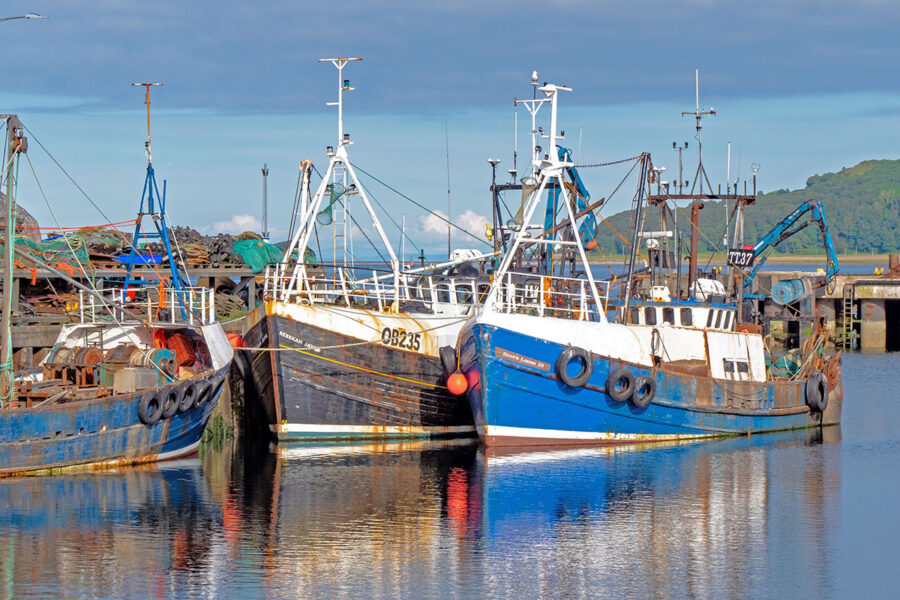Changes to immigration rules are set to increase the costs of employing foreign crew on skilled worker visas by more than 50%.
From next spring, the government will increase the earnings threshold for overseas workers from the current £26,200 to £38,700.
The move was slammed by industry leaders as a ‘blatant political move’ with an eye to the next general election, which is due to be held next year.
It will hit boats working inside the 12-mile limit in Scotland and Northern Ireland, which are already struggling with crewing problems, particularly hard.
The salary rise is part of a package of measures that the Home Office said aims to ‘slash migration levels and curb abuse of the immigration system, delivering the biggest ever reduction in net migration’.
The move comes on the back of mounting pressure on the government to cut the number of people entering the UK, after record net migration figures were recently announced. “This package will mean around 300,000 people who came to the UK last year would now not be able to come,” said the Home Office.
It said the nearly 50% increase in the earnings threshold for overseas workers would ‘encourage businesses to look to British talent first and invest in their workforce, helping us to deter employers from over-relying on migration, whilst bringing salaries in line with the average full-time salary for these types of jobs’.
The package also ends the 20% going-rate salary discount for shortage occupations, and replaces the Shortage Occupation List – which includes fishing crew – with a new Immigration Salary List, which will retain a general threshold discount. The Migration Advisory Committee will review the new list against the increased salary thresholds in order to reduce the number of occupations on the list.
The measures also include a big increase in the annual immigration health surcharge that skilled occupation visa holders must pay, from £624 to £1,035.
The government said it is prioritising growing the domestic workforce through its ‘Back to Work Plan’ – a package of employment-focused support that it is claimed will help people to get off benefits and move into work.
Home secretary James Cleverly he was ‘taking decisive action to halt the drastic rise in our work visa routes’.
‘A blatant political move’
Mike Park, chief executive of the Scottish White Fish Producers’ Association (SWFPA), who is heavily involved in recruiting migrant crew through the SWFPA’s Crew Services division, said the earnings threshold rise for skilled worker visas would hit boats hard that were already struggling financially.
“They’ve taken a political judgement with no thought for business whatsoever,” he told Fishing News.
“The one component business needs for success is stability. Since our transition from transit visas to skilled worker visas, we’ve been working on the basis of the minimum salary, and all of a sudden we now see that increasing by almost 50%.
“No business can operate in that really unstable world, and on top of that you’ve now got an increase in the NHS surcharge of well over 50%, as well as all the costs of getting a visa for the individual and of the employer becoming certified.
“This is a blatant political move with an election clearly in their sights – all they’re doing is hampering the economic growth of companies, making the hiring of people very, very difficult.”
The SWFPA chief said the government was being ‘naive’ in its Back to Work Plan to expand the domestic workforce, because it assumed there was a large domestic workforce available and that it wants to be upskilled. He said in many parts of the country unemployed people were in reality unemployable.
“We understand that immigration needs to be cut, but to be targeting businesses in this way is unforgivable.”
On the plan to replace the Shortage Occupation List with a new Immigration Salary List, he said it would be critical for the industry how the new list is defined. “The industry will be taking the position that this is a distinctly different business from a number of other businesses,” he said.
He said the low profitability of vessels in Northern Ireland, the Clyde and the west coast of Scotland means they do not have the economic reserves or flexibility to pay the new minimum salary levels.
“I guess what we have to do now is to work out how to make ourselves distinctly different from other industries to ensure it doesn’t apply to us – but immediately we’re on the back foot again,” he said.
“The problem is that the Tories used to understand business, but they’ve come to the point where they’ve lost the grasp of economics and the business world.
“This is all about political manoeuvring and political gaming. It’s not about business – they’ve taken the focus off that, and are focusing on winning the next election.”
This story was taken from the latest issue of Fishing News. For more up-to-date and in-depth reports on the UK and Irish commercial fishing sector, subscribe to Fishing News here or buy the latest single issue for just £3.30 here.
Sign up to Fishing News’ FREE e-newsletter here.








